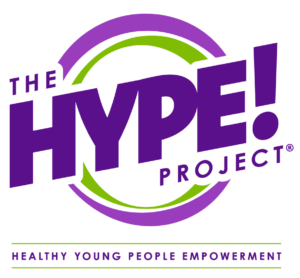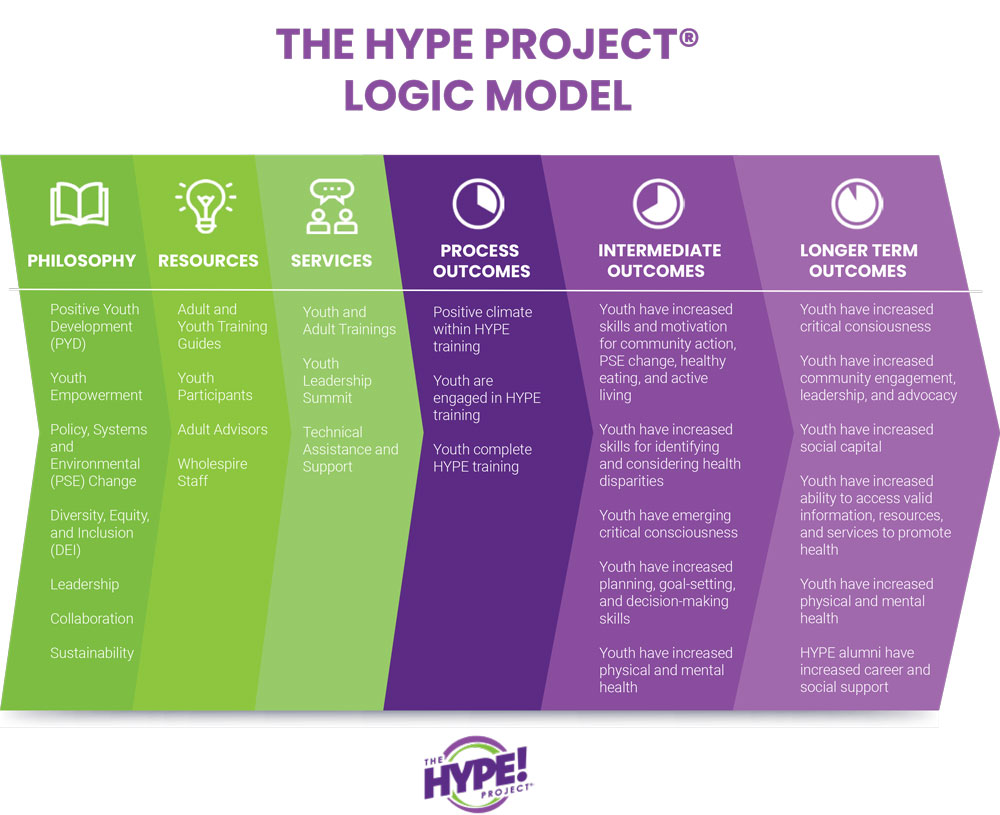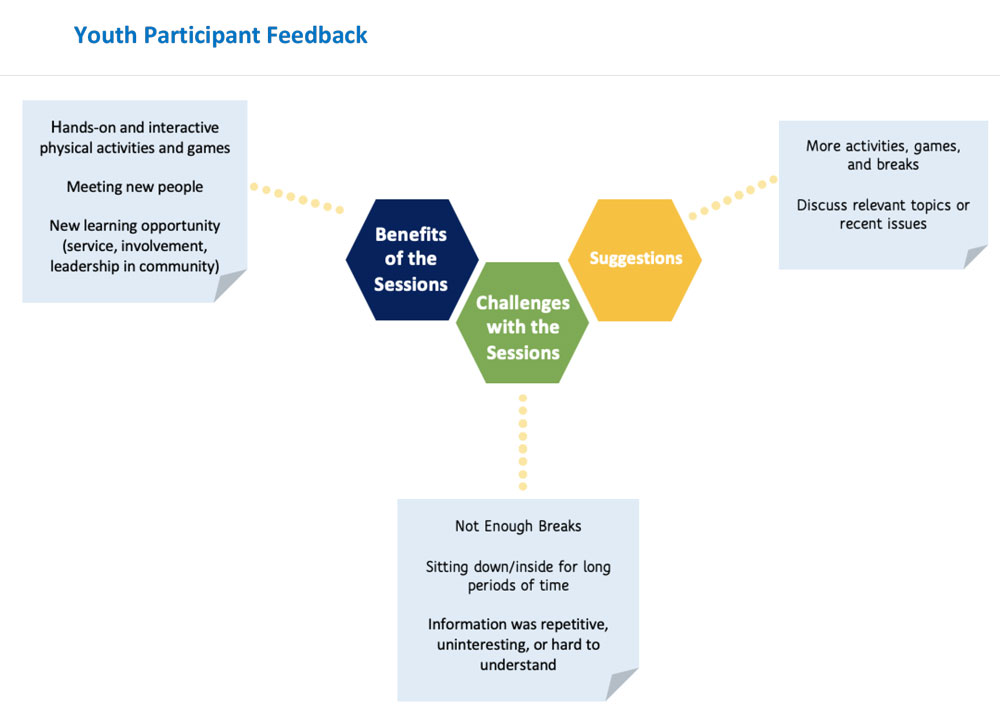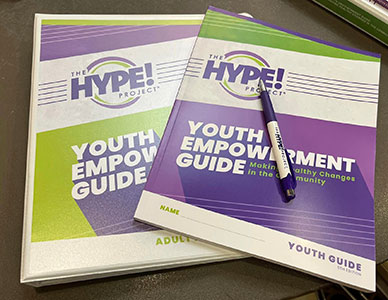
At Wholespire, we know the importance of evaluating projects and initiatives to determine an impact or to make improvements to future endeavors. After 10 years of implementation and collecting feedback from adult and youth participants, The HYPE Project® underwent a thorough evaluation and makeover. Working with evaluators at The University of South Carolina and designers at TRIO Solutions, Inc., Wholespire revamped the curriculum and brand to provide participants with a more inclusive and engaging experience.
“We recognized that HYPE needed content updates as best practices of healthy eating and active living, youth engagement and advocacy had evolved over the last ten years,” said Executive Director Meg Stanley. “We wanted the initiative to look relevant and align with the Wholespire brand. Plus, our strategic plan identifies the sustainability of HYPE as a priority.”
In 2021, Wholespire contracted with the Youth Empowerment in Schools and Systems (YESS) lab at the University of South Carolina School of Psychology, an applied research group focused on translating theories of child development to pragmatic prevention and intervention strategies.
YESS evaluators analyzed all existing HYPE resources, tools, and data to pinpoint strengths, weaknesses, and improvements needed to fully engage youth and their adult advisors. They developed a new logic model following a series of five strategically facilitated discussions with Wholespire staff.
New Logic Model

The new HYPE logic model provides a visual representation of Wholespire decision-making and goals as well as the process by which youth experience The HYPE Project and the respective outcomes. New points of interest within the logic model are:
Philosophy – Seven main values guide Wholespire decision-making, planning, and training for The HYPE Project:
- Positive youth development (PYD) is an intentional approach to engage youth within their communities, schools, organizations, and more to provide opportunities for youth to enhance their interests, strengths, and abilities. Wholespire uses the PYD Developmental Assets Framework within HYPE to foster positive development through external assets and internal assets.
- Youth empowerment is a strengths-based process to engage youth in building skills, knowledge, and resources to control and influence decisions, reach greater well-being, and promote positive community change. Youth specifically build skills related to advocacy, youth organizing and civic, sociopolitical development, and self and collective efficacy.
- Policy, systems and environmental (PSE) change is a way of changing and improving the community for its members. PSE changes also reflect population- or community-focused efforts. Using PSE change, youth are engaged in critical thinking processes in HYPE training to build awareness and skills to promote PSE change related to healthy eating and active living in their communities.
- Diversity, equity and inclusion (DEI): To center DEI, Wholespire seeks to focus on racial equity throughout the entire organization. Wholespire seeks to address health disparities in South Carolina communities and increase access to healthy eating and active living options. HYPE trainings are developed to be age and culturally relevant so that youth can be effective champions for change within and beyond the program.
- Leadership involves efforts to be champions for change and experts of best practices to promote wellness in communities. Using leadership, youth are engaged in a youth-led project to create PSE change related to healthy eating and active living. Youth are also prepared to be allies regarding diversity, equity, and inclusion within their communities.
- Collaboration is the process of people and/or organizations working together transparently to determine similarities in intentions and efforts. To prioritize collaboration, youth collaborate with peers, adult advisors, and community members in efforts to make PSE changes related to healthy eating and active living. Youth share HYPE projects and results with community members and stakeholders.
- Sustainability involves doing work in a way that ensures the viability of an organization and support to the community. Thinking about sustainability in The HYPE Project, youth projects focus on sustainable change related to healthy eating and active living within their communities. Additionally, HYPE alumni have career and social support from the organization.
Outcomes – Process, intermediate and long-term outcomes are the resulting changes or impacts of the program that youth are expected to experience as a result of completing all phases of HYPE. Outcomes are influenced by philosophy and values and can be influenced by available resources and services provided by Wholespire through The HYPE Project.
- Process Outcomes: These are the immediate intended impacts of completing a certain part of a program. For The HYPE Project, the process outcomes are an acceptable level of engagement and a positive climate during training sessions for the first two phases of the curriculum, and the completion of the sessions.
- Intermediate Outcomes: These are the intended impacts immediately following the full completion of a program. After completing the last three phases of the curriculum, outcomes are an increase in skills and motivation for healthy eating and active living in regard to community action and PSE change; an emerging critical consciousness; increased skills for identifying and considering health disparities; increased planning, goal-setting, and critical thinking skills; and increased physical and mental health.
- Long-term Outcomes: These are the intended impacts months to years after fully completing a program. Six months after completing HYPE, youth will have increased: critical consciousness, community engagement, leadership and advocacy, social capital, ability to access valid information, resources, and services to promote health, physical and mental health and career and social support for HYPE alumni.
Outcomes are measured by surveying youth during and after their HYPE experience. This new methodology is necessary to ensure the integrity and viability of The HYPE Project.
New Curriculum

In addition to improving the logic model, YESS evaluators looked at the content and activities in the curriculum. Considering feedback from youth and adult advisors collected in 2018-2020, YESS evaluators suggested:
- Integrating Youth-Led Participatory Action Research (YPAR) Projects for future training structure to engage youth in projects that specifically address and promote issues that are important to youth in their communities. Through YPAR, youth specifically have opportunities to engage in more hands-on and service-learning activities to enhance youth skills regarding National Health Education Standards (NHES) related to goal-setting and self-management
- Integrate concepts and activities from Youth Empowerment Solutions (YES) MVPA, a modular curriculum for promoting positive youth development related to behavioral and socio-emotional health skills. YES MVPA curriculum focuses on self-care as it relates to activism in order to support youth health and well-being as they work for social and systems-level change.
- Identifying the NHES as they apply to each section within the curriculum.
- Incorporating new activities, games and breaks.
- Incorporating relevant topics or recent issues into discussions.
All of the suggestions made by YESS evaluators and through past HYPE youth and adult advisor surveys were carefully considered and included in the revised HYPE curriculum.

New Branding and Tools
Wholespire worked with designers at TRIO Solutions, Inc., in Mt. Pleasant, SC, to redesign the HYPE brand and curriculum and to develop a supply kit for adult advisors to use when teaching the curriculum. A more modern and relevant logo and curriculum design was produced that aligns with the Wholespire brand.
“Our goal was to give adult advisors and teens a better visual and hands-on experience when learning about PSE change, community health, bias, stereotypes, and how the information impacts individual behaviors and access to healthy choices,” says Stanley.
Wholespire recently launched the new curriculum and tools at an adult advisors training. During the training, representatives from eight new HYPE teams in South Carolina gathered to gain a better understanding of the requirements and expectations of The HYPE Project. They received an overview of the Think and Learn Phases and tried many of the new activities.
So what’s next for The HYPE Project? Wholespire is currently talking to organizations outside of South Carolina that are interested in implementing HYPE. Our ultimate goal is for HYPE to be nationally recognized and used widely across the United States.
